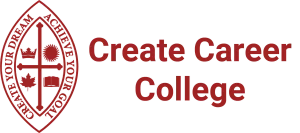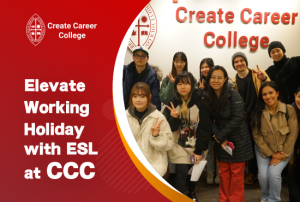Job interview questions and answers are the common and popular topics that job seekers search on the search engine. So are you ready to step into your next job interview? Do you wish you could anticipate every question the hiring manager might throw at you?
We have got the best thing for you: a list of 15+ most frequently asked interview questions, with our expert advice on how to answer them. We are not suggesting you memorize the canned responses for every single question. It is recommended that immerse yourself in the realm of potential interview questions.
Create Career College is a private college that offers career-focused diploma programs and English courses. For all the 2-year diploma programs, students will have to complete 12 months of academic courses and a 12-month co-op experience. International students can take advantage of the co-op program to gain real-world work experience, which can certainly enhance their prospects of securing a full-time job in the future.
So, let’s get started!
Table of Contents
How CCC helps students prepare for interviews?
Create Career College (CCC) employs a Co-op Specialist whose role is to assist students in securing co-op jobs, preparing resumes, and succeeding in interviews. Interviews in Canada might differ from those in students’ home countries. This is precisely why our Co-op Specialist offers support to help students refine their interview skills.
CCC students could schedule a one-on-one consultation with the Co-op Specialist to address any questions related to the co-op program. During the consultation, students will receive valuable interview guidance from the Co-op Specialist, along with the opportunity to participate in mock interviews. For some common job interview questions and answers, please read the belo article.

Common Job Interview Questions and Answers
The job interview questions and answers can vary between industries. Below are examples of job interview questions that employers commonly ask. Job seekers should also prepare interview questions and answers that are unique to their industries.
Tell me about yourself.
Interviewees can start the introduction with a brief overview of their background, highlighting how their relevant experiences and skills align with the job they are interviewing for.
Sample Answer
Sure, I have a strong background in digital marketing with over 5 years of experience. I’ve successfully managed campaigns for both B2B and B2C clients, resulting in a 20% increase in lead generation for my last company. I’m excited about this opportunity because it aligns perfectly with my expertise in SEO and social media marketing.
Why do you want to work here?
For this answer, interviewees should focus on highlighting particular aspects that attract you. For example, the company’s culture, reputation, products, or services. It is advised not to reply with generic statements like “I am drawn to your competitive salaries” or “I am simply in need of a job.” Instead, focus on showcasing genuine interest and alignment with the distinct qualities of the organization.
Sample Answer
I’ve been following your company for a while and I’m impressed by your innovative approach to sustainable technology. Your commitment to reducing environmental impact resonates with my personal values. Additionally, your reputation for nurturing employee growth is something I’m excited to be a part of.
What are your biggest strengths?
Choose a strength that is related to the job and makes you a great fit for the role. Stories are more memorable than facts alone. So do not just list all the adjectives about your strengths. Just pick 2-3 and elaborate on each with proper examples.
Sample Answer
One of my greatest strengths is my ability to analyze data and draw actionable insights from it. For instance, in my previous role, I analyzed customer behaviour data, which allowed us to tailor our marketing strategies and increase customer engagement by 25%.
What is your biggest weakness?
When addressing this question, it’s important to avoid using insincere humblebrags as weaknesses. Merely stating that you’re a perfectionist does not truly showcase a genuine weakness. Instead, consider discussing a minor weakness that you acknowledge and are actively working to improve. This approach demonstrates your self-awareness and commitment to personal development.
Sample Answer
I used to struggle with public speaking, but I’ve been actively working on it. I joined a public speaking club and volunteered for presentations at work. Over time, I’ve become much more comfortable speaking in front of groups and have seen significant improvement.
Why are you leaving your current job?
Maintaining honesty while being diplomatic is crucial in your response to this question. The Human Resources manager wants to know whether you have a good reason for leaving the previous or current job. They also want to ensure they’re bringing on a candidate who is stable and committed. You can emphasize your desire for new challenges, career advancement, or a stronger alignment between your skills and the job you are applying for.
Sample Answer
I’m looking for a new opportunity because I’ve achieved my goals at my current company and I’m excited to take on new challenges. I’ve learned a lot and feel ready to contribute my expertise to a team with a broader scope.
Why was there a gap in your employment?
You should be honest in acknowledging any gaps in your employment history. Then, you can explain the reasons behind the gap, but it’s important to avoid delving into excessive detail or sharing personal information. Instead, focus on highlighting the activities you engaged in during the gap period, such as taking online courses, freelancing, volunteering, tending to family matters, or working on personal projects.
Sample Answer
During the gap in my employment, I took some time to focus on my personal development and explore new opportunities. I completed a project management course that not only improved my organizational skills but also exposed me to new strategies for project coordination. I also volunteered with a local nonprofit, where I had the chance to apply my communication skills and contribute to community initiatives. Now, I’m excited to leverage these experiences and skills in a new role, and I’m fully committed to making a positive impact.
Where do you see yourself in five years?
When answering this question, interviewees can express their long-term career aspirations and align them with the role and industry. They can also show their plan to leverage their skills and experiences to contribute to the company’s success.
Sample Answer
In five years, I see myself as a senior manager in the marketing department, leading a team and contributing to strategic decisions. I’m excited about the potential to continue growing within this company and taking on increasing responsibilities.
What is your greatest achievement at work?
You can select an achievement that directly relates to the job you are interviewing for. It should highlight skills and qualities that are valuable in the new role. Structure your response using the STAR method (Situation, Task, Action, Result) to provide a clear and comprehensive answer.
Sample Answer
One of my proudest achievements was implementing an automated invoice processing system in my previous company. This system significantly reduced processing time, minimized errors, and increased efficiency by 30%. My ability to analyze the needs of the company, select the appropriate software, and manage the implementation process positively impacted the entire accounting department.
How do you handle stress and pressure?
By answering this question, you should share a concrete example of when you successfully handled stress and pressure. You can highlight specific strategies you used to cope with stress and pressure. For example, how you prioritize tasks, break down larger projects into manageable steps, and use time management techniques to make sure you meet deadlines even under pressure.
Sample Answer
Having advanced from a Senior Software Engineer to pursuing the Software Engineering Manager position, I approach stress and pressure with a strategic and collaborative mindset. I believe in fostering open communication within teams, creating an environment where challenges are openly discussed and resolved collectively. My experience in handling complex technical projects has honed my ability to allocate tasks effectively, leverage team strengths, and adapt to changing priorities.
By setting clear expectations and promoting a balanced work approach, I ensure that my team remains motivated and focused during high-pressure situations. My technical proficiency and leadership skills enable me to guide my colleagues through challenges while maintaining a positive and productive atmosphere.
Why do you change your career path?
The reason for changing your career path must be clear and honest. You can focus on the positive aspects of your decision. Also, explain the motivation for you to transition into a new career, and discuss how your skills and experiences from your previous career are transferable and relevant to the new field.
Sample Answer
While I’ve thoroughly enjoyed my career in customer service, I’ve realized that my skills and interests align well with the challenges and opportunities presented in a Sales Manager role. Throughout my experience in customer service, I’ve honed strong communication, relationship-building, and problem-solving skills that are directly transferable to sales. I’ve found great satisfaction in assisting customers and addressing their needs, and I believe these skills will be instrumental in helping me effectively lead a sales team.
What type of work environment do you prefer?
Before the interview, you can research the company’s culture and work environment. This will help you tailor your response to match their expectations. You can mention a work environment that you find productive and enjoyable. These include collaboration, a supportive team, clear communication, opportunities for growth, and a balance between independence and teamwork.
Sample Answer
I thrive in a work environment that values collaboration, open communication, and a sense of camaraderie among team members. I appreciate the opportunity to share ideas and contribute to projects in a supportive setting. At the same time, I also value the focused and independent work environment where I can dive deep into tasks and achieve results. I’ve noticed that your company emphasizes a culture of teamwork and innovation, which aligns well with my preferences. I’m excited about the prospect of being part of a team that shares a common goal and works together to achieve it.
Do you have any questions for us?
It is an opportunity for you to demonstrate your interest in the company, gather more information, and further showcase your qualifications. The direction to prepare some thoughtful questions could be asking about the company, the role, team dynamics, growth opportunities, and the interview process.
Sample Answer
- Can you tell me more about the day-to-day responsibilities of this role?
- What do you think are the most important qualities for someone to excel in this position?
- How would you describe the company’s culture and values?
- What opportunities for professional growth and development are available?
- Could you provide more insight into the team I’d be working closely with?
- What are the next steps in the interview process?

Situational Questions in an Interview
A situational question is a type of interview question that presents a hypothetical scenario or situation related to the job you are applying for. The reason behind asking such questions is to evaluate the interviewee’s approach to addressing particular challenges, problems, or decisions that might emerge in the work environment. Responding to these questions provides interviewees with an opportunity to demonstrate their problem-solving skills and decision-making abilities to the interviewers. Let’s see some job interview questions and answers for situational questions.
What would you do if you were assigned a project with a tight deadline and limited resources?
You should showcase your problem-solving skills, adaptability, and ability to manage challenges effectively.
Sample Answer
If I were assigned a project with a tight deadline and limited resources, my approach would involve several key steps. First, I would break down the project into manageable tasks and prioritize them based on their impact. Then, I would carefully assess the available resources and find creative ways to optimize their usage. I would develop a well-structured project plan, allocate tasks to team members according to their strengths, and establish clear milestones.
Throughout the project, I would maintain open communication with stakeholders, addressing challenges transparently and suggesting necessary adjustments. In situations where unforeseen obstacles arise, I would rely on problem-solving and collaboration within the team to find efficient solutions. My commitment to delivering results would drive me to put in the extra effort needed to ensure the project’s success.
Imagine a situation where a major client is unhappy with the service they received. How would you handle it?
The HR manager wants to see if you have a genuine commitment to customer satisfaction and whether you prioritize client needs and concerns. This question also tests your problem-solving skills, communication skills, conflict resolution, stress management, and team collaboration abilities.
Sample Answer
If a major client expressed dissatisfaction, I would reach out to them immediately to understand their concerns. I’d actively listen to their feedback, apologize for any shortcomings, and assure them that their concerns are a top priority. I would collaborate with relevant teams to identify solutions and present a detailed plan to address the issues. Continuous communication and follow-up would be key until the client’s concerns are resolved.
If you were faced with a sudden change in project requirements, how would you adapt and manage the situation?
You should demonstrate your adaptability and flexibility to adjust the work in an unexpected situation. Sudden changes often come with new problems to solve. Adapting to new project requirements could involve reallocating resources, communicating with team members and stakeholders, or managing constraints differently.
Sample Answer
If I encountered a technical problem I couldn’t solve, I would first review available resources such as documentation, forums, and online tutorials to troubleshoot the issue. If that didn’t yield results, I’d consult colleagues or experts in the field for guidance. I believe in seeking help when needed and collaborating with others to find solutions.
Suppose you were leading a team, and there was a disagreement among members about the project's direction. How would you handle this situation?
This question aims to evaluate the interviewee’s leadership skills when facing team conflicts. HR wants to know how effectively you can mediate and facilitate discussions, guide the team through disagreements and maintain a positive and productive atmosphere.
Sample Answer
If there was a disagreement within my team about the project’s direction, I would schedule a team meeting to openly discuss everyone’s perspectives. I’d create a safe space for each member to share their views and encourage active listening. I would then facilitate a constructive discussion to find common ground and, if needed, help the team reach a compromise that aligns with our goals.
Behavioural Interview Questions
A behavioural question is a type of interview question that aims to understand how you have behaved or acted in specific situations in the past. These questions are based on the idea that past behaviour is a good predictor of future behaviour. Interviewees can showcase their skills, competencies, and qualities relevant to the job during the interview. The job interview questions and answers for the behavioural interview can be found below.
Tell me about a challenging situation you've faced at work and how you handled it.
You should give an example to demonstrate your ability to handle challenges in a professional setting. Describe the context of the situation, and explain the specific challenge you encountered. Highlight your strategies, actions and decisions to solve the problem and facilitate team collaboration.
Sample Answer
In a previous role, we had a tight deadline for a project, and a key team member unexpectedly fell ill. I stepped in, reorganized tasks, and led the team to complete the project ahead of schedule. This experience taught me the importance of adaptability and effective communication under pressure.
Can you describe a situation where you had to deal with a difficult coworker? How did you handle it?
Choose a relevant example that reflects your ability to handle interpersonal challenges in a professional environment. Highlight your efforts to actively listen and understand the coworker’s perspective, the approach to address the conflict, and the positive outcome.
Sample Answer
I once worked with a coworker who consistently missed deadlines, affecting our team’s productivity. I scheduled a private meeting to discuss the issue, focusing on solutions rather than blaming them. We created a shared timeline, and I offered to help if needed. This approach improved our collaboration and project outcomes.
Can you share a time when you had to lead a team through a challenging period?
Describe the context of your team’s challenge and the goal that needed to be achieved. Then mention your actions to lead the team through the challenge, showcasing your leadership, problem-solving, adaptability, and communication skills.
Sample Answer
During a company-wide reorganization, I was chosen to lead my team through the changes. I organized team meetings to address concerns, provided regular updates, and offered guidance on navigating the transition. By fostering a sense of unity and keeping morale high, we successfully adapted to the changes.
Job Interview Questions and Answers: Conclusion
Whether you are searching for a job in Canada or anywhere else in the world, it is essential for every job seeker to prepare for common job interview questions and answers. Most job types, including full-time, part-time, co-op, internship, and contract positions, require job interviews to select the most suitable candidate. The list of 15+ top job interview questions and answers provided above can help interviewees effectively prepare for their interviews.
If you are looking to gain more work experience before securing a full-time job, opting for a co-op program could be a better choice. While enrolled in the 2-year diploma program at CCC, one year is dedicated to a co-op experience. This approach allows students to apply classroom learning to real-world situations, offering firsthand insights into the industry, its trends, challenges, and opportunities. Throughout the co-op program, you will have the chance to connect with various professionals in the company as well as the industry, facilitating valuable networking opportunities.




